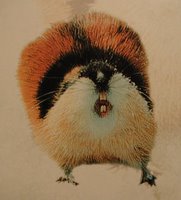

Charles Elton, the Oxford ecologist I was researching last week, is famous for discovering all sorts of things about animal populations. Particularly, the spectacular boom-and-bust population cycles of arctic lemmings. Now, usually, when you read about Elton's discovery, you get something like
this:
The lemming population cycle, with peaks 1,000 times as high as its valleys, was the first discovered, explains Peter Turchin of the University of Connecticut in Storrs. Biologist Charles S. Elton pointed it out in 1924, elaborating on a notion that struck him while browsing in a Norwegian nature book. He couldn't read the words, but the pattern in the numbers jumped out.
But I'm happy—nay, delighted—to report that the full story of Elton's scientific discovery is much, much more interesting. And much, much funnier.

Let's set the scene. Elton had been on an Oxford University expedition to Spitsbergen. To Bear Island, more specifically, where he and his colleagues (including his tutor, Julian Huxley) had been conducting ecological and geological surveys. On the way back, Elton spent his last few pounds on a book on Norwegian mammals by a chap called Collett. And here we have, straight from the archives, in Elton's own words, the real story of how he came by his flash of insight.
In 1923 I was doing 12 hours of research a day in the old Zoology department. When Collett’s book began to open the window on “cycles”, I was a bit slow at first to see the significance of the thing. Here was a series of migration years for lemmings in different parts of Norway. I made maps of them and put them in a semi-circle on the floor of my research cubicle, and stared at them off and on for about four hours, feeling that they had some further message. Then, as I was sitting on the seat of a lavatory near my room, brooding on the meaning of the charts, it came “in a flash” that they represented the overflow of periodically increasing populations – that is, they were an index of a cycle in populations. This is by far the biggest break-through of ideas in ecology that I have ever made.
What a winner! Lavatorial humour in the history of science is a rare and precious thing. By the way, Elton goes on to send himself up delightfully, saying:
Incidentally, just note that whereas Archimedes got an idea from something overflowing, I got an idea about overflowing by sitting in a similar sort of place.
Carry on, Elton.

 Charles Elton, the Oxford ecologist I was researching last week, is famous for discovering all sorts of things about animal populations. Particularly, the spectacular boom-and-bust population cycles of arctic lemmings. Now, usually, when you read about Elton's discovery, you get something like this:
Charles Elton, the Oxford ecologist I was researching last week, is famous for discovering all sorts of things about animal populations. Particularly, the spectacular boom-and-bust population cycles of arctic lemmings. Now, usually, when you read about Elton's discovery, you get something like this: Let's set the scene. Elton had been on an Oxford University expedition to Spitsbergen. To Bear Island, more specifically, where he and his colleagues (including his tutor, Julian Huxley) had been conducting ecological and geological surveys. On the way back, Elton spent his last few pounds on a book on Norwegian mammals by a chap called Collett. And here we have, straight from the archives, in Elton's own words, the real story of how he came by his flash of insight.
Let's set the scene. Elton had been on an Oxford University expedition to Spitsbergen. To Bear Island, more specifically, where he and his colleagues (including his tutor, Julian Huxley) had been conducting ecological and geological surveys. On the way back, Elton spent his last few pounds on a book on Norwegian mammals by a chap called Collett. And here we have, straight from the archives, in Elton's own words, the real story of how he came by his flash of insight.
No comments:
Post a Comment